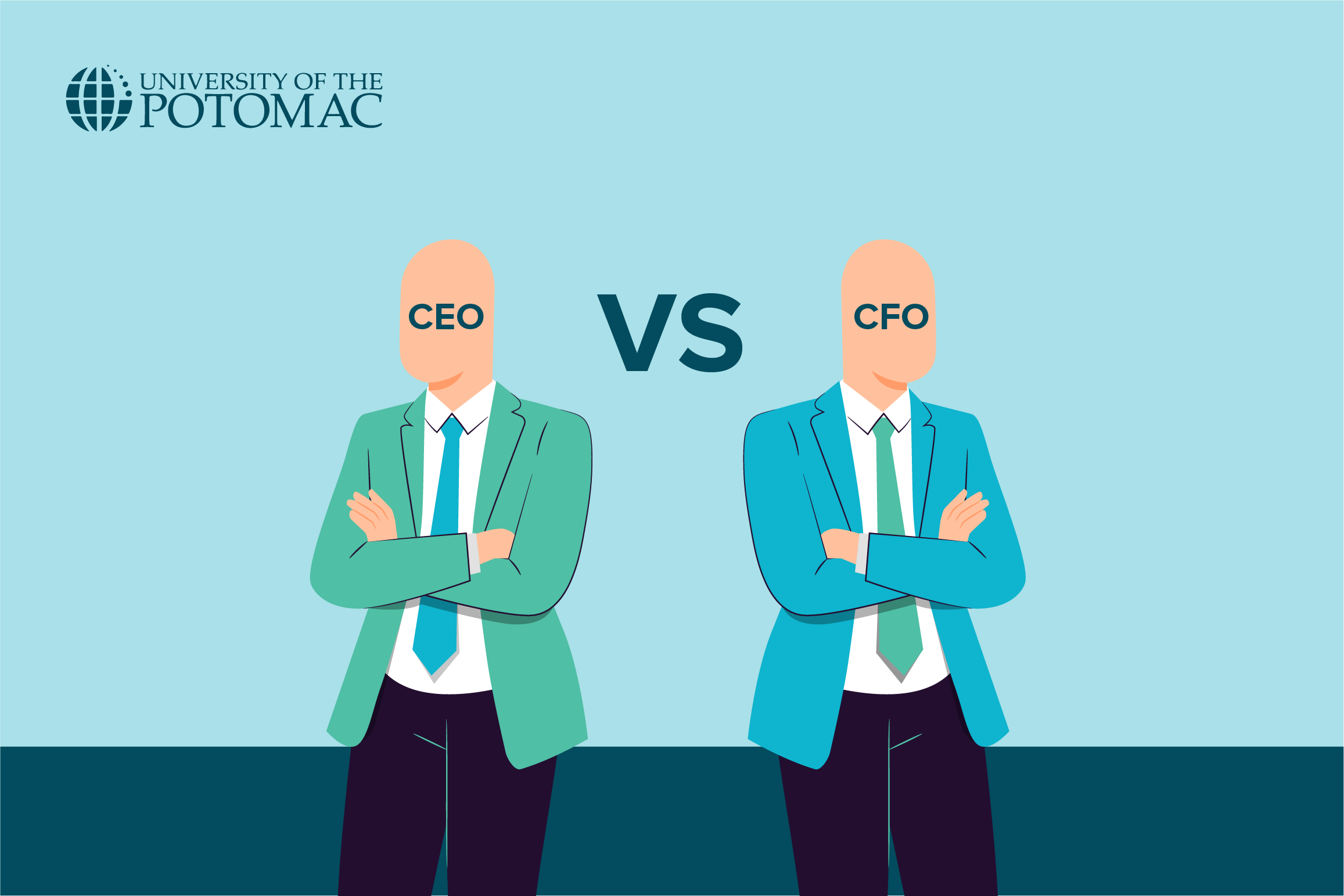Chief Executive Officers (CEOs) and Chief Financial Officers (CFOs) are among the roles that stand at the pinnacle of the hierarchy in a typical corporate structure. They guide the company through business operations and financial management and help steer it toward success. However, the similarity in their titles and some overlapping responsibilities make it easy to confuse the two.
The “C” and “O” in both titles signify their leadership status, but the “E” for Executive and “F” for Financial highlights a fundamental difference in their functions. This distinction is crucial, as the roles of Chief Executive Officer and Chief Financial Officer, while intertwined, are marked by key differences that impact how a company operates and prospers. So, read on to uncover the distinctions between CEO vs. CFO and understand why both roles are indispensable to the success of any organization.
What Is a Chief Executive Officer (CEO)?
The Chief Executive Officer is the highest-ranking executive in a company. They are the primary decision-makers responsible for the organization’s overall vision, strategy, and direction through various phases, challenges, and market dynamics. Their influence extends across all facets of the business, from strategic planning and operational oversight to maintaining corporate governance and ethical standards.
Role and responsibilities of a CEO
Their role covers a broad range of functions, all aimed at ensuring the company’s success and longevity. Some of their responsibilities include:
- Developing and implementing the company’s strategic plans, aligning them with the organization’s mission and goals
- Leading the executive team and fostering a company culture that promotes productivity and morale
- Making critical decisions on investments, mergers, acquisitions, and other significant business moves
- Building and maintaining relationships with shareholders, the board of directors, and other key stakeholders
- Overseeing the company’s performance and making adjustments to ensure targets are met
What Is a Chief Financial Officer (CFO)?
The Chief Financial Officer (CFO) is the highest-ranking financial executive in a company, entrusted with the critical task of managing the organization’s financial health. As a vital member of the executive leadership team, the CFO plays a crucial role in shaping the company’s financial strategy and ensuring its long-term fiscal stability.
Role and responsibilities of a CFO
A CFO’s role encompasses a wide array of responsibilities to ensure that the company’s finances align with its overall goals. These responsibilities include:
- Developing financial strategies, preparing budgets, and conducting financial forecasting.
- Ensuring compliance with regulations and safeguarding the company’s assets.
- Evaluating investment opportunities and managing the company’s investment portfolio.
- Implementing cost-saving measures and efficiency improvements.
- Deciding on debt, equity, and other capital structure issues.
Key Differences Between a CFO and CEO

The roles of CFO and CEO differ significantly in several areas, including their responsibilities, qualifications, reporting structure, and more. Below, we’ll look into each of these differences.
Scope of responsibilities
The CEO’s responsibilities encompass the entire organization, from strategic planning to operational oversight. They are the leaders who chart the course for the company’s future, ensuring that all aspects of the business align with the overall strategic goals. Therefore, their scope of responsibilities is broader and includes everything from driving growth initiatives to overseeing major corporate decisions and maintaining a strong organizational culture.
In contrast, the CFO’s responsibilities are more specialized, focusing on the organization’s financial health. This includes managing resource allocation, financial planning, and risk management.
While the CEO is concerned with the company’s overall direction, the CFO ensures that the financial underpinning necessary to achieve that direction is solid.
Qualifications and background
CEOs typically have backgrounds in management, business, marketing, operations, or technical fields, bringing a broad range of skills and perspectives to the position. They often start their careers with a bachelor’s degree in business or a related field, gaining foundational knowledge in economics, finance, and management. To advance to the CEO level, many pursue further education, such as an MBA or other advanced degrees, which equip them with strategic thinking, leadership skills, and a deep understanding of complex business environments. Their career paths might include significant experience in leadership roles, where they hone their ability to guide organizations through various challenges and growth phases.
On the other hand, CFOs usually have a strong background in finance or accounting, reflecting their focus on the financial side of business. This specialization is evident in their educational qualifications, which often include a Bachelor of Science in accounting or finance. Depending on whether they pursue public or private accounting, some professionals also obtain professional certifications such as the CPA (Certified Public Accountant), demonstrating their expertise in accounting principles and practices. Additionally, advanced degrees like a master’s in finance or an MBA with a concentration in finance are common among CFOs.
Reporting structure
Another difference between a CEO and a CFO is how responsibilities and communication flow. CEOs report directly to the board of directors and are accountable for the company’s overall performance. This top-tier position places the CEO in direct communication with the board, allowing them to implement the company’s strategic vision and make high-level decisions that shape the company’s direction. The CEO’s role involves translating the board’s broad objectives into actionable plans.
CFOs, however, report to the CEO and are primarily responsible for the company’s financial integrity and health. This reporting structure allows the CFO to support the CEO by providing critical financial insights and strategies that underpin the CEO’s broader objectives. The CFO’s role involves detailed financial planning, analysis, and reporting, which are essential for informed decision-making at the executive level. By managing the company’s finances, the CFO ensures that the CEO has the necessary financial data to make strategic decisions.
Risk and accountability
CEOs bear the ultimate responsibility for the company’s success or failure. Their accountability spans strategic, operational, and financial domains, making them responsible for guiding the company through both opportunities and challenges. The CEO must also anticipate and mitigate risks across various aspects of the business, from market competition to operational inefficiencies, and must be prepared to navigate crises and capitalize on opportunities as they arise. Their broad scope of accountability requires them to maintain a holistic view of the organization and its environment, driving innovation, growth, and sustainability.
CFOs, while also carrying significant responsibility, focus mainly on financial risks and regulatory compliance. They ensure that the company’s financial practices are sound and that all regulatory requirements are met. By maintaining rigorous financial controls and compliance measures, the CFO supports the overall stability and integrity of the company’s financial operations. Their role is crucial in providing the CEO and board with accurate financial information, enabling informed strategic decisions that contribute to the company’s long-term success.
Interested in pursuing a degree?
Fill out the form and get all admission information you need regarding your chosen program.
This will only take a moment.
Message Received!
Thank you for reaching out to us. We will review your message and get right back to you within 24 hours.
If there is an urgent matter and you need to speak to someone immediately you can call at the following phone number:
- We value your privacy.
Leadership style
Lastly, CEOs and CFOs exhibit different leadership styles, reflecting their distinct roles within an organization. These styles not only shape how they approach their responsibilities but also how they inspire and guide their teams.
For example, when facing a common challenge such as a major organizational restructuring, CEOs tend to have a visionary and inspirational leadership style, focusing on the big picture and motivating the entire organization toward a common goal. On the other hand, CFOs have a more analytical and detail-oriented approach, focusing on precision and financial accuracy.
The CEO would start by explaining the need for change and the vision for the future, showing how it aligns with the company’s long-term goals and enhances its success. They would engage all levels of the organization through town hall meetings, workshops, and direct communication to build trust and transparency. By fostering a shared sense of purpose, the CEO would inspire employees to embrace the change and see its growth opportunities, boosting morale.
In contrast, CFOs would focus on the financial and operational details of the restructuring. They would conduct a thorough financial analysis to understand the cost-benefit impact, identifying areas for efficiency gains and cost reductions. Additionally, they would develop a financial plan, budget for potential expenses, and reallocate resources to ensure financial stability.
Although different, these two leadership styles work together to facilitate a successful transition, balancing strategic ambition and financial prudence.
CEO vs. CFO Salary
In the United States, the estimated total pay for a CEO is $370,825 per year, ranging from $278,000 to $519,000. The wide range in CEO salaries can be attributed to various factors such as the company’s size and profitability, the industry in which the company operates, and the geographical location.
For instance, CEOs of large multinational corporations or tech companies often command salaries at the higher end of the spectrum, reflecting the complexity and scale of their roles. In contrast, CEOs of smaller companies or non-profit organizations might be on the lower end of the salary range.
On the other hand, CFOs in the United States earn an estimated total pay of $325,878 per year, with a range from $244,000 to $447,000. While CFOs generally earn slightly less than CEOs, their compensation is still substantial.
Similar to CEOs, the variation in CFO salaries can also be influenced by the company’s size, industry, and location. For example, the demand for skilled financial executives can increase compensation in regions with a high concentration of corporate headquarters or financial institutions.
The substantial compensation packages for both CEOs and CFOs reflect the high level of expertise, experience, and responsibility required for these roles.
The Bottom Line
While the CEO and CFO both hold critical roles within a company, their responsibilities, qualifications, and impacts are distinct. Understanding these roles and how they interact helps to paint a complete picture of corporate leadership and the division of responsibilities within an organization. This knowledge can also help individuals decide which career path they might want to pursue.
For those considering these roles, Potomac offers strong educational foundations with a Bachelor of Science in Business for aspiring CEOs and a Bachelor of Science in Accounting for future CFOs. So whether you’re inspired to chart the course for a company’s future or ensure its financial integrity, remember: next to every great CEO is also a great CFO, making sure the numbers add up to success!
Frequently Asked Questions (FAQs)
Can a CEO be a CFO?
In theory, a CEO could also serve as a CFO, especially in smaller companies or startups where roles are often consolidated. However, in larger organizations, the distinct nature and demands of each role typically require separate individuals to ensure optimal performance and focus.
Is the CEO higher than the CFO?
Yes, the CEO is higher than the CFO in the corporate hierarchy. The CEO has the ultimate responsibility for the company’s overall performance and reports to the board of directors. The CFO, while a top executive, reports to the CEO and focuses specifically on financial management.
What are the other C-suite roles in a company?
Beyond the CEO and CFO, other key C-suite roles include: Chief Operating Officer (COO), Chief Information Officer (CIO), Chief Marketing Officer (CMO), Chief Human Resources Officer (CHRO), and Chief Compliance Officer (CCO).










